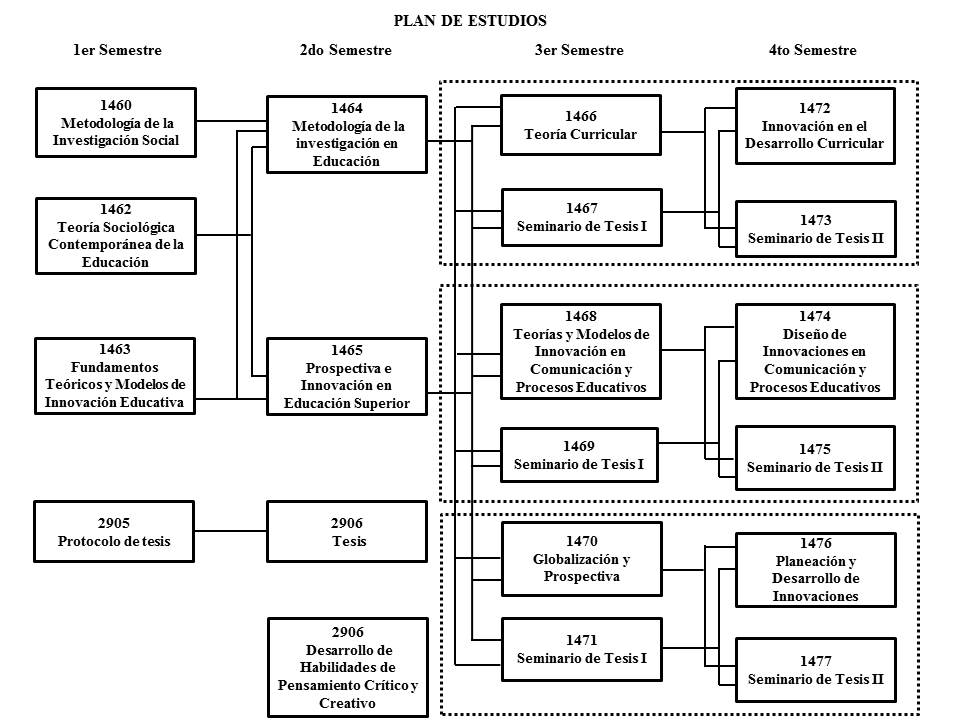GENERAL OBJECTIVE
The main aim of the MEI is to form personnel with high academic quality who are able to conceive, promote and develop innovations in higher education, and also research to aid educational change, allowing further understanding of the interactive educational process and the economical, political and social framework, considering as context the new international scenarios.
SPECIFIC OBJECTIVES
- To contribute to the qualitative improvement of scholars´ performance in higher education institutions.
- To contribute to the qualitative improvement in education of graduate students who will integrate into Northwestern Higher Education Institutions and aid them to face with a renewed vision the future demands of the new professions which are required by the modernization and those derived by the increase in university enrollment.
- To prepare high performance professional who are able to design educational innovation projects and to perform research to support them.
- To provide top notch knowledge to scholars and to form them as innovative change agents within the educational processes.
- To provide theoretical knowledge which allows the analysis and discussion in the educational innovation field, the understanding of current higher education issues, conceived as an imminent and highly complex social phenomenon.
- To form high performing scholars who can design educational policies.
- To train and educate scholars able to use cutting-edge technology in the design of original and innovative alternative solutions to the growing complexity of the educational demand in Northwestern Mexico.
APPLICANT AND GRADUATE STUDENTS PROFILES
Applicant profile
The prospective student has to:
- Have a good disposition for teamwork.
- Have an open mind to change.
- Be responsible and committed to complete the required assignments.
- Be sensitive in order to understand his or her surroundings.
- Be willing to invest the time required to accomplish the objectives defined and expresses in the MEI´s program.
- Be intellectually able to study a masters degree (reading comprehension and academic writing in Spanish, reading comprehension in English, and abstract thinking).
- Have basic knowledge about educational sciences (sociological, psychopedagogycal, and philosophical).
- Have basic computer skills.
- Be able to express personal motives and interest in any area where educational innovation can be applied to.
Graduate profile
The graduating student will be qualified to:
- Undertake educational research in higher education.
- Apply educational methods and innovation research in communication and teaching-learning processes in the classroom.
- Solve, in the best way possible, academic concerns applying research innovations as he or she deems fit.
- Contribute, with scientific bases, in the design of study programs and syllabi, and in the development of the teaching-learning processes, using research innovations.
- Advise on academic concerns regarding innovations which authorities and/or decision-makers from different academic bodies have to solve.
- Decide considering several alternatives of ideal solutions for diverse educational issues.
- Design and apply educational models which integrate cutting-edge technology in response to the growing complexity of the educational demand.
STUDY PROGRAM OVERVIEW
Study program areas
The curricular organization is designed in three areas of training: common, focus, and research.
Common area
It is offered in two semesters in which the basic knowledge (conceptual and methodological foundation) is provided. This area underpins the theoretical and methodological reflection about social sciences and educational innovation; it serves the purpose of helping the student to build a conceptual framework in order to develop a research project. This area comprises two core subjects offered in the first semester and two in the second semester.
Focus area
There are three areas of focus provided which constitute the basis for the Thesis Seminars and Research Work required in order to earn the Master’s degree. Each area includes two courses in the third semester and two in the fourth semester, and they vary according to the changes in social needs and the developments in different research areas that nourish the MEI. In this way, considering the last graduating cohorts, the areas have aligned as follows:
- Development and foresight in higher education. Different development models applied in higher education institutions in Northwestern Mexico are analyzed; as well as, government policies depicted in those institutions in the light of the Institutional Development Programs. The thematic lines of study are clustered as follows: student trajectories, mentoring programs, and different topics about training of university students.
- Communication and educational processes in higher education. Different ways in which agents and subjects in the educational context exchange information are addressed; also, how those ways, drawing from their development and derivation of technological tools, support and modify the educational processes. The thematic lines of study are clustered as follows: postgraduate study, development of science, and emerging thematic issues related to higher education institutions.
- Curriculum development in higher education. This area incorporates an analytical approach (conceptual and methodological) to issues in the curriculum in higher education; it emphasizes in the development and application of curriculum models in higher education institutions from the region. The thematic lines of study undertaken are: teacher training, teaching-learning process, and use of new technologies in institutions of higher education.
Research area
The research area is the axis which articulates the whole program through the Thesis Seminar courses. This area of the curriculum is worked on since the first semester and it provides the methodological support for the construction and development of research projects.



